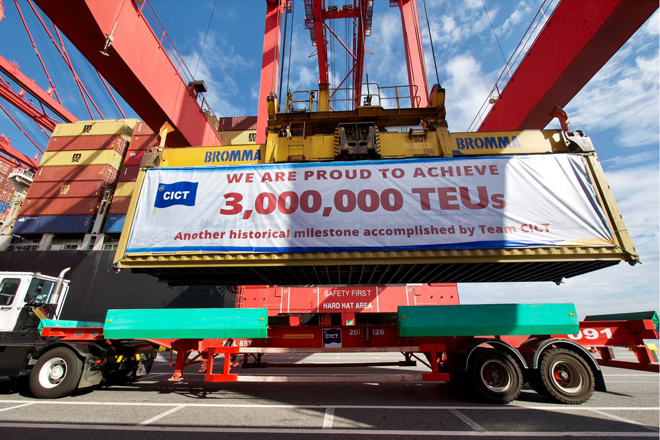Colombo International Container Terminals (CICT) is ending 2021 on a high note, celebrating its milestone 10th anniversary in Sri Lanka on 22nd December and reaching the milestone of 3 million teus within a year for the first time.
The company said its throughput for the full year is expected to reach approximately 3.1 million teus by 31st December, representing a healthy increase of around 11 per cent over 2020.
Notably, CICT achieved its first 1 million teus milestone in just eight months, from January to August 2015 and ended that year with 1.56 million teus. The company handled 2 million teus in a single year for the first time in 2016. It recorded incremental increases in annual throughput thereafter, handling 2.38 million teus in 2017, 2.67 million teus in 2018, 2.9 million teus in 2019 and 2.89 million teus in 2020.
The Company, which manages the Colombo South Terminal, commenced construction of the terminal in December 2011 and began port operations in 2013. The volume handled by the terminal has grown five-fold since then.
“We are delighted to have played the role expected of us with flying colours in our first decade as an integral part of the Port of Colombo,” CICT CEO Mr Jack Huang said. “We have been a significant contributor to the port’s throughput by attracting vessels which would otherwise have bypassed Colombo because of the absence of a deep-water terminal. CICT is also proud to have led the way in promoting eco-friendly operations and innovations in service.”
Sri Lanka’s single largest private-sector foreign investment project at the time, CICT’s noteworthy progress included completion of Stage 1 of the terminal to a quay length of 400m by July 2013, reaching Stage 2 with a quay length of 1000m in December the same year, and completing the terminal with a quay length of 1200m by April 2014.
CICT is also responsible for several firsts in service innovation and eco-friendly operations. These include a US$ 10 million programme to convert its entire fleet of diesel operated rubber-tyred-gantry cranes to electricity driven rubber-tyred gantry cranes (E-RTGs) which have zero carbon emissions by 2017. As a result, CICT achieved a 45 per cent reduction in carbon dioxide emissions and a 96 per cent reduction in diesel consumption.
In 2019 the Company added two new mega Quay Gantry Cranes (QGCs) which are now the tallest cranes in the Port of Colombo, to a fleet of QGCs which was already the biggest gantry cranes in the Indian Subcontinent region. This, along with other purchases such as six new Rubber-tyred Gantry Cranes (RTGs) and 12 Prime Movers, were made to enhance the terminal’s deep-water capacity and make Colombo one of the few ports in Asia capable of handling vessels of 22,000 + TEUs. In the same year CICT commissioned Sri Lanka’s first, and South Asia’s most advanced, Dangerous Goods Storage Facility (DGSF) with an investment of US$ 1.5 million.
For five consecutive years since 2017, CICT was also adjudged the Asian Freight, Logistics and Supply Chain (AFLAS) awards winner for the ‘Best Container Terminal in Asia’ in the Under 4 million TEUs category, by Asia Cargo News.
CICT is the first and currently the only deep-water terminal in South Asia equipped with facilities to handle the largest vessels afloat. In 2021 it handled Ever Ace, which is one of the largest container ships in the world with a nominal carrying capacity of 23,992 TEU. The Company has also attracted several other large vessels plying the Asia-Europe routes to Colombo. Of these, MSC Apolline (23,782 TEU), Milan Maersk (20,568 TEU), EMC Ever Glory (20,388 TEU), MSC Maya (19,224 TEU), Mogens Maersk (18,300 TEU), MSC New York (16,652 TEU), CMA CGM Marco Polo (16,020 TEU), Edith Maersk and EMC Thalassa Hellas (each 14,000 plus TEUs) and their sister vessels are now regular callers at CICT.

